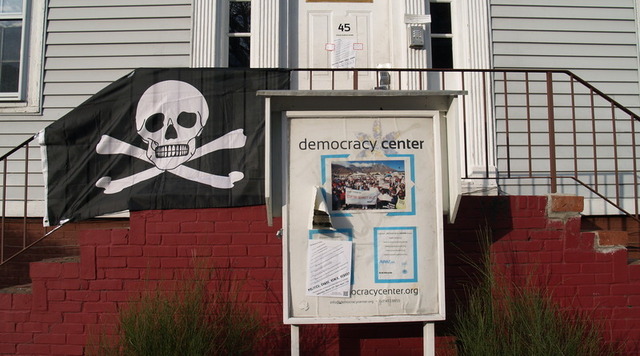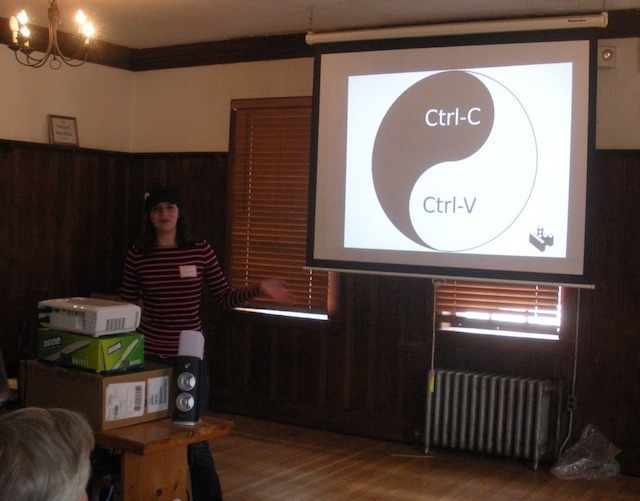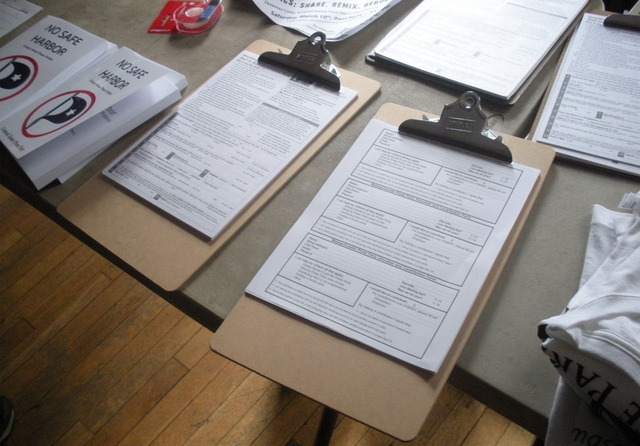
"If robots had a religion, I think this would be it," said Lauren Pespisa, an official member of both the Pirate Party and the "church" of Kopimism.
Using a projector propped up on top of a box of plastic cutlery, the 24-year-old Web developer described the one true faith of those who take file sharing seriously—very seriously. A crowd of several dozen had gathered on March 10 in Cambridge, Massachusetts for the first ever state-level Pirate Party conference in the US, and Pespisa was one of the speakers.
The church of Kopimism considers the sharing of digital information to be a sacred act, she said, and holds as its primary tenet: "'Copy and Paste what thou wilt' shall be the whole of the law." In her slide deck, Pespisa proudly showed one of the Kopimists' cherished symbols, a yin and yang with the copy-and-paste commands "Ctrl-C" and "Ctrl-V."
"There isn't really a god involved or anything. You're not going to hell if you don't share," Pespisa said, one of many remarks that drew waves of laughter from her fellow pirates. Kopimism has a founder—Isak Gerson—"but we don't worship him."
Kopimism is an officially recognized religion in Sweden. While the First United Church of Kopimism in the US doesn't hold such sanctified status, joining is easy: All you have to do copy one of the Kopimi symbols (pronounced "copy me") and register with an online form requiring only your name and e-mail address.
Kopimism does have at least one thing in common with traditional religions—the presence of an evil oppressor. In this case, the adversary is rightsholder groups like the RIAA and MPAA, which "persecute" file-swappers and hosting sites. ("We have our people persecuting us. Every religion needs that," Pespisa said. She also noted that someone she knew in college had been sued for torrenting files and had paid to settle the matter.) The Kopimists remain uncowed, however—Gerson's blog carries the bold statement, "I encourage reckless and inconsiderate copying that denies all consideration of copyright and similar bullshit."
What drew Pespisa to a political party of pirates and a religion of file-swappers? Back in college, Pespisa switched from her initial focus on ballet to information technology. "It makes sense looking back," she told me after her talk. "I grew up on the Internet. … I sort of consider myself a citizen of the Internet. I'm very attached to it. I'm almost more from the Internet than I am from Massachusetts."

Pirates with a party plank
Formed in 2010 and certified by state officials in 2011, the Massachusetts Pirate Party has only 20 or so registered members—yet its first conference attracted 40 curious attendees, interested in the party platforms of copyright reform, Internet privacy, abolishing patents, and open government. In March, the group took over the Democracy Center—a "21st century meeting house" just up the road from Harvard's campus—and draped a pirate flag next to the building's sign.
As political party gatherings go, this one was modest. A table held voter registration forms, Pirate Party pamphlets, and T-shirts. Attendees milled about in the Rosa Parks Room, then moved to the Mandela Room next door for presentations. During lunch, people ate pizza, discussed the finer points of copyright law, and debated the question of whether author and scientist Richard Dawkins is a "douchebag." Heavy on copyright and technology policy, the day's agenda ranged from talks on how to run for office (a talk available for download from the Pirate Bay, naturally) to discussions of Internet security to the use of "guerrilla tactics" to fight questionable enforcement of copyright law.
Founded in Sweden in January 2006, the Pirate Party (Piratpartiet) gained popularity after organizing protests in the wake of a police raid that temporarily shut down the Pirate Bay torrent website later that year. In the years since, it has seen some political success across northern Europe. Just a couple weeks ago, the Pirate Party won seats in the German state of Saarland. This followed previous successes including the Swedish Pirate Party gaining European parliamentary seats in 2009 and the Berlin party gaining seats in state elections in 2011, according to the blog of Pirate Party founder Rickard Falkvinge. An international conference of Pirate Parties will take place in the Czech Republic in mid-April.
Unlike in Europe, where Pirates have won elections and influenced policy, the Pirate Party movement in America is nearly invisible. Nationwide, about 3,000 US residents identify themselves as political pirates, according to a rough estimate provided by Brad Hall, former chairman of the US Pirate Party and vice chairman of the Florida branch of the party. Although Hall credits Massachusetts with having the busiest Pirate Party, Florida has 200 registered Pirates, many times more than Massachusetts.
The US Pirate Party, first launched back in 2006, was dissolved in 2011 but has been recreated with a new structure that takes less of a top-down approach. Weekly virtual meetings are held in IRC. "The 'new' USPP is more state party friendly," Hall said. "The state parties are free to do their own thing, but the Pirate National Committee was designed so that the state parties can talk to each other and do things jointly."
The first Massachusetts Pirate to run for office, J.P. Hollembaek, studied political science at UMass-Lowell and served in the US Marine Reserve. He's gathering the signatures needed to get on the ballot for state representative in the 16th Middlesex District, but he couldn't make it to the party conference in Cambridge; even pirates have car trouble.

reader comments
185